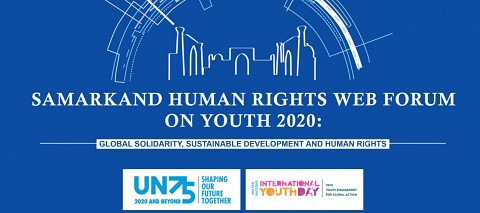
GCED Basic Search Form
Quick Search
أنت هنا
الأخبار

On 12-13 August 2020, the Samarkand Human Rights Web Forum was held in Samarkand in the format of a videoconference on different issues of rights of youth.
It was a part of the UN75 initiative proclaimed by the United Nations during the year of its 75th anniversary and served as a follow-up to the Asian Human Rights Forum held in Samarkand on 22-23 November 2018.
It was aimed to discussing improvements in existing international and regional instruments and mechanisms for the protection and promotion of rights of youth.
The Forum was organized by the Government of the Republic of Uzbekistan, the National Centre for Human Rights, the Ministry of Foreign Affairs of the Republic of Uzbekistan in partnership with the Office of the United Nations High Commissioner for Human Rights (OHCHR), the United Nations Country Team in Uzbekistan, the OSCE Project Coordinator in Uzbekistan and the Friedrich Ebert Foundation.
During the two-day discussion, the participants discussed the role of young people in the implementation of sustainable development goals, identified key problems in the implementation of their rights, raised issues of human rights education for youth, as well as considered the role of the young generation in ensuring a safer future towards 2030.

The Forum was attended by representatives of UN specialized agencies, including the International Labour Organization, the International Organization for Migration, the United Nations High Commissioner for Human Rights, the United Nations Development Programme, the United Nations Educational, Scientific and Cultural Organization, the United Nations Population Fund, the United Nations Children's Fund as well as representatives of the African Union, the Asian Parliamentary Assembly, the Commonwealth of Independent States, the Council of Europe, the Inter-Parliamentary Union, the Organization of Islamic Cooperation, the Organization for Security and Co-operation in Europe, the Shanghai Cooperation Organization.
More than 30 youth organizations from all the regions of Uzbekistan participated in the Forum, including the Youth Union of Uzbekistan, the Youth Parliament under the Legislative Chamber of the Oliy Majlis, the National Movement "Yuxalish" and others.
The Director-General of UNESCO, Ms Audrey Azoulay, gave a welcome address at the opening of the Forum participants. In her video message, she stressed the importance of calling for universal peace, and noted that human rights must become an everyday reality.

"The universal message of peace has been vital for the past 75 years. It will be even more important in the future, because we need to come to making human rights an everyday reality, we still have a very long way to go especially for young people. Making these rights a reality, creating a new opportunity for youth – this is what UNESCO’s commitment to the future generation is all about. It means allowing them to reach the full potential through education and UNESCO is, as you know, strongly committed to this right especially for vulnerable youth, for girls, for women, for refugees. Secondly, this means giving young people the right tools to navigate tomorrow’s world, a world, where digital issues and an environmental protection will be more essential than ever. UNESCO works to provide youth with the skills they need in these fields. Lastly, it means supporting young people’s involvement in these policies so they can be active participants, not just observers". Full video message (24:48).
Mr Alexander Schischlik, Chief of Youth and Sport Section of the Social and Human Sciences Sector of UNESCO Headquarters gave a presentation at Session 3 of the Forum. He spoke about how to strengthen human rights education (HRE) for youth and gave examples of different UNESCO initiatives:
"Strengthening human rights education for youth means greater efforts to ensure that HRE is holistic, inclusive and equitable – that it is available for all youth groups in society, through formal, non-formal and informal spaces. It must also be value-based, promoting universally shared values such as non-discrimination, equality, respect and dialogue. All this, of course, requires also capacity and investment for adaptability and contextualization – from content and curricula to teachers, from learning methods to learning spaces, from families to community services".
Mr Schischlik stressed that the promotion of civic engagement of youth contributes to enhancing human rights education:
"It is a means for them (youth – ed.) to contribute to driving change and to improve the societies they live in. This provides a sense of purpose, meaning and belonging that connects youth to their societies and which is absolutely fundamental in preventing risk behaviours, violence or marginalization".
The Forum resulted in the adoption of the Samarkand Resolution "Youth 2020: Global Solidarity, Sustainable Development and Human Rights", which calls upon States to undertake a number of initiatives. The Resolution also called on the UN General Assembly to take note of Uzbekistan's initiative to adopt a new International Convention on the Rights of Youth. At the 72nd UN General Assembly, the President of the Republic of Uzbekistan H.E Mr Shavkat Mirziyoyev proposed the development of this Convention.
URL:
